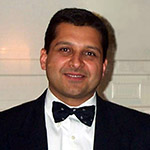
Ali Shilatifard, PhD, known for his fundamental work in molecular epigenetics, has been named the Robert Francis Furchgott Professor of Biochemistry and the Chairman of the Department of Biochemistry and Molecular Genetics, effective September 1.
Shilatifard joins Northwestern University Feinberg School of Medicine from the Stowers Institute for Medical Research, where he has worked as an internationally acclaimed investigator since 2007. There, he has published numerous studies regarding the basic mechanisms of chromatin biology in health and disease, particularly in childhood leukemia.
“Ali is an internationally recognized leader in chromatin biology, gene expression and epigenetics, and on how the misregulation of these pathways contributes to human cancer,” said Eric G. Neilson, MD, vice president for Medical Affairs and Lewis Landsberg Dean. “We are privileged and excited to have him spearhead our new Department of Biochemistry and Molecular Genetics at Feinberg.”
Fueled by an early passion for science, Shilatifard immigrated to the United States in 1984 to earn a BS in organic chemistry at Kennesaw State University. He went on to receive a PhD in biochemistry from the Universities of Georgia and Oklahoma. While he was a Jane Coffin Childs Postdoctoral Fellow, he biochemically purified the protein ELL, which is found in translocation with the MLL gene in childhood leukemia, and identified it as an RNA polymerase II elongation factor. He hypothesized that the misregulation of transcriptional elongation control is central in cancer pathogenesis, which his laboratory proved true later in his career with the discovery of ELL as a component of the Super Elongation Complex. In 1997, Shilatifard joined the Edward Doisy Department of Biochemistry at Saint Louis University School of Medicine where he rose to the rank of professor of biochemistry and associate director for basic sciences at the Saint Louis University Cancer Center.
After discovering the function of ELL early in his career, Shilatifard focused his lab’s research on understanding the molecular properties of the protein and its partner, the MLL gene. This research has been a springboard for a large body of work, including the identification of a gene called SET1 within its complex, which Shilatifard named COMPASS, and many additional studies involving chromatin biochemistry and transcription. Currently, Shilatifard is the principal investigator of three R01 grants funded by the National Institutes of Health.
“Joining the Northwestern University Feinberg School of Medicine represents an incredible opportunity for my laboratory and I to transition our biochemical and molecular studies in different model systems to human health given the wealth of outstanding faculty and resources available for cross collaborations at Feinberg, Northwestern University’s Evanston campus and the greater Chicago community,” says Shilatifard. “I am also very excited about the ideas and the vision of Dean Neilson for Northwestern Medicine and look forward to serving the University.”
Shilatifard is actively involved in the scientific community. He is the editor for journal Molecular and Cellular Biology and member of the Board of the Reviewing Editors for eLife. Shilatifard has been teaching the popular Gene Expression course at Cold Spring Harbor Laboratory every summer for more than ten years and also serves on the scientific advisory boards of Genentech, Keystone Symposia and the Max-Planck Society. He is frequently invited to give international keynote lectures. Among his many honors, Shilatifard has also won the American Society for Biochemistry and Molecular Biology-AMGEN Award and the American Cancer Society Award of Excellence. Dr. Shilatifard moves to Chicago with his wife, Laura, and their four children.
Shilatifard replaces Eugene Silinsky, PhD, who has served as interim chair of Biochemistry since March of 2014 when it split from the Department of Molecular Pharmacology and Biological Chemistry. Silinsky was chair of the former department for nearly two decades.
“We’re incredibly appreciative of Gene’s service to the school throughout the last 20 years and during the department’s recent transition,” said Dean Neilson. “I would also very much like to thank Pat Spear, PhD, and the Biochemistry Chair search committee for their outstanding work.”






